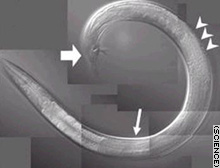 |
Caenorhabditis elegans hermaphrodite that developed into a male under resource-limited conditions |
Abstract of a paper by appearing in Science 11/7/03 (from cnn.com)
Thursday, November 6, 2003 Posted: 3:00 PM
EST (2000 GMT)
WASHINGTON (AP) -- Male sex is important even for the lowly nematode, a soil worm that can reproduce without the masculine gender. A new study shows that keeping guys around may be essential to survival of the species.
Researchers long have wondered why the male nematode continues to exist since the simple worm reproduces so well without a partner. The answer, says Elizabeth B. Goodwin, a University of Wisconsin researcher, is that when conditions are tough, the male makes a key genetic contribution to keep the species going.
 |
Caenorhabditis elegans hermaphrodite that developed into a male under resource-limited conditions |
"The X chromosome coming from the dad makes all of the difference" in the species survival, said Goodwin, an associate professor of genetics and the senior author of a study appearing Friday in the journal Science.
"Sometimes we wonder why men are around, and maybe this explains it," she said, before adding with a laugh: "Not entirely, but it helps."
The nematode is a favorite species used by researchers to answer such basic questions about sex and reproduction. The small creature, known as Caenorhabditis elegans, lives in the soil and feeds off bacteria.
It is tiny, less than the thickness of a human hair, but it offers huge benefits to science. Its skin is clear and researchers can watch biological processes taking place inside the animal. And the animals matures quickly, going from embryo to adult in just four days.
C. elegans has another characteristic that intrigues scientists: Nearly 99.9 percent of the population is hermaphrodite -- females with two X chromosomes but which can produce sperm and self-fertilize to make babies.
However, 0.1 percent of the population is male, with one X chromosome. Since the worm can self-replicate, researchers wonder, why would the species continue to make males if they are not needed?
|
|
"It is more advantageous to a species to reproduce by self-fertilization than by having males and using cross-fertilization," said Goodwin. Sexual reproduction, she said, is costly in time and energy.
In the new study, Goodwin and her co-authors from the University of Alberta in Canada limited the food fed to the nematodes to monitor the effect of mild starvation on reproduction.
They found that when confronted with famine, about half of the hermaphrodite nematode larvae that had been produced by a sexual reproduction turned into males, switching gender by shedding one of their X chromosomes.
This caused the worms to develop into males that look different, liver longer and were able to pass along their genes through sperm. Hermaphrodite nematodes produced by self-fertilization, however, were unable to make the gender switch.
"This suggests the reason these worms have males is that it allows the progeny from cross-fertilization to respond to a changing environment better than just having hermaphrodites," Goodwin said.
Having more males around lowers the number of progeny, an appropriate response when food is in short supply. Also, Goodwin said male nematodes live longer and are better at surviving in tough conditions because they can move farther to forage for food.
"The hermaphrodite is not very mobile," she said. "It is sort of the couch potato of the worm world."
Fundamentally, said Goodwin, the study proves that "sex is good" for the species.
Return to "In the News - 2003"